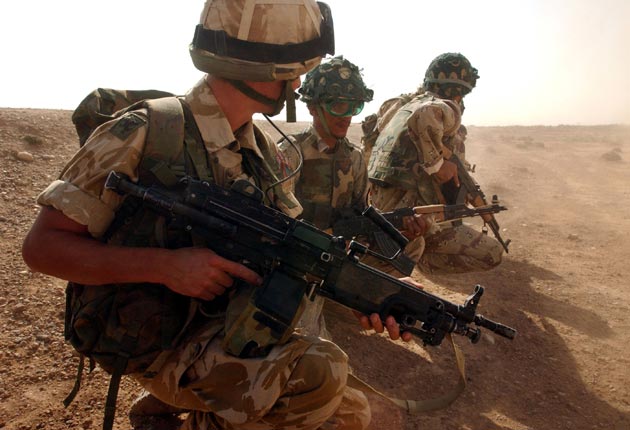'Hold inquiry into Army abuse in Iraq'
Judge calls for single investigation to cover 46 claims by civilians

Your support helps us to tell the story
From reproductive rights to climate change to Big Tech, The Independent is on the ground when the story is developing. Whether it's investigating the financials of Elon Musk's pro-Trump PAC or producing our latest documentary, 'The A Word', which shines a light on the American women fighting for reproductive rights, we know how important it is to parse out the facts from the messaging.
At such a critical moment in US history, we need reporters on the ground. Your donation allows us to keep sending journalists to speak to both sides of the story.
The Independent is trusted by Americans across the entire political spectrum. And unlike many other quality news outlets, we choose not to lock Americans out of our reporting and analysis with paywalls. We believe quality journalism should be available to everyone, paid for by those who can afford it.
Your support makes all the difference.Ministers have been told by a senior judge to consider opening an independent inquiry into all allegations of abuse made by Iraqi civilians against the British Army.
The move could lead to the biggest investigation into military malpractice ever heard in this country.
Mr Justice Silber, in a note written to lawyers acting for the Defence Secretary, Bob Ainsworth, has told the Government: "My provisional view is that I am uncertain what is to be gained by the Secretary of State continuing to contest these claims for investigation."
The judge, who is in charge of the management of the claims before the court, says he is concerned about the cost to the taxpayer of hearing 46 outstanding individual cases, and the impact this would have on the resources of the High Court.
It is estimated that the cases will take 10 years to go through the courts at a cost of tens of millions of pounds to the taxpayer.
Mr Justice Silber says that the Ministry of Defence has already shown itself to be "unable to give proper disclosure" in the case of the Battle of Danny Boy in 2004 in southern Iraq, where it is alleged that British soldiers murdered Iraqi civilians.
He warns that not holding an independent single inquiry could lead to a "further waste of valuable court time".
The judge's letter emerged at the same time as the Government was served with the first claim of abuse brought by an Iraqi woman.
Samahir Abbas Hashim, 32, six months pregnant at the time of the alleged assault, claims she was so badly beaten by soldiers that she lost her baby. Mrs Hashim alleges that at 2am on 21 June 2006, she was sleeping with her children on the roof of her home in Al-Zubayr, Basra. Her husband was sleeping downstairs.
She says she awoke to the sound of a large explosion which blew open the front door of her house and heard British soldiers run inside. Some of them held her husband to the ground while others rushed to the rooftop where she had been sleeping with her children. She says she was frightened and rushed to protect her youngest child. At this point, she claims, a female British soldier kicked her on her back. As a result, she says, she suffered a miscarriage the next day.
Lawyers for Mrs Hashim have written to the Ministry of Defence claiming that her case is evidence of "systematic and gratuitous abuse and degradation of Iraqi women" by British Forces. Further allegations have been made in eight other cases brought by husbands and relative of women who say they have been assaulted.
Solicitor Phil Shiner from the firm Public Interest Lawyers, which represents 66 Iraqis in 46 separate cases, argues that the Government must hold a single inquiry into the UK's detention policy in south-eastern Iraq: "There are so many cases and so many have so much in common – similar allegations at similar facilities, often involving the same people. We can't have these dragged out over 10 or 15 years. This is the only rational option."
The allegations include claims that British troops subjected Iraqi prisoners to rape, sexual humiliation and torture.
Two public inquiries have already been launched. The first, into the death of hotel worker Baha Mousa, 26, in British military custody in September 2003, began hearing evidence in July. It is looking at how prisoner-handling techniques banned by the Government in 1972 – including hooding, food and water deprivation and painful "stress positions" – came to be used in Iraq.
In November, the Ministry of Defence announced details of a second inquiry into allegations that 19-year-old Hamid Al-Sweady and up to 19 other Iraqis were unlawfully killed and others ill-treated at a British base in May 2004 after the Battle of Danny Boy.
The Armed Forces Minister, Bill Rammell, has so far resisted calls for a public inquiry into the treatment of detainees by British forces. But an MoD spokesman said that Government lawyers were actively looking at complying with the wishes of the Iraqis.
On Mrs Hashim's claim, Mr Rammell said: "The MoD recently received a letter alleging the abuse of an Iraqi woman, but has not yet been given any evidence. Abuse allegations are thoroughly investigated, as this one will be, and – where proven – those responsible are punished. However, these are allegations and must not be taken as fact."
Join our commenting forum
Join thought-provoking conversations, follow other Independent readers and see their replies
Comments